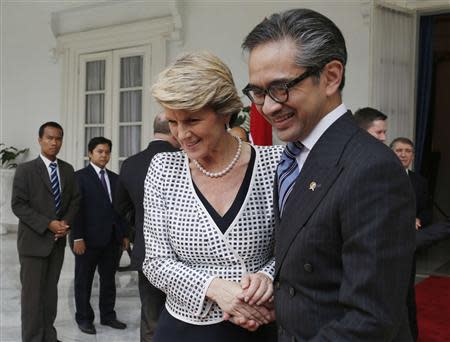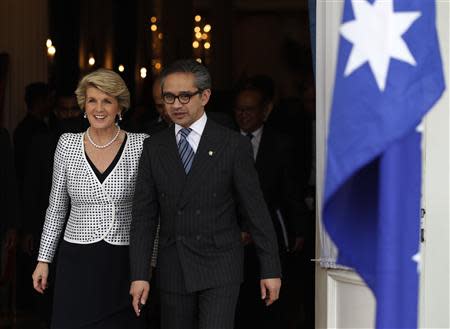Indonesia, Australia agree "hotline" to resolve diplomatic spat
JAKARTA (Reuters) - Indonesia and Australia announced on Thursday that they would set up a hotline as part of efforts to repair relations following media reports last month that Canberra had spied on top Indonesian officials. Indonesia has already suspended military and police cooperation over preventing asylum seekers from setting sail to Australia and there were concerns the diplomatic row could hit trade relations. "We have agreed to establish a special communications channel or a hotline to ensure we can resolve the issues, the implementation and so that we can avoid any unintended consequences," Australian Foreign Minister Julie Bishop said on the subject of military and intelligence cooperation. Speaking to reporters in the Indonesian capital after talks with her counterpart Marty Natalegawa, Bishop added, "We are pleased that our cooperation will continue in economic, financial areas, education and trade and investment." But Natalegawa told reporters it was only the start. "I think today's meeting can contribute to restoring the relationship but the 6-point roadmap is there and there's a long way to go," he said, referring to demands Indonesia wants met in response to the spying report. The spat and a separate angry complaint from China over Australian comments about tensions in the East China Sea have tested the diplomacy of the young government of Prime Minister Tony Abbott which came to power in September. The reports that triggered Indonesia's outrage quoted documents leaked by former U.S. National Security Agency contractor Edward Snowden, suggesting Australia had tried to monitor the phones of top Indonesian officials in 2009. Abbott later sent a letter to Indonesian President Susilo Bambang Yudhoyono promising his country would not take any action that might hurt ties between the neighbours. (Reporting by Kanupriya Kapoor, Writing by Jonathan Thatcher; Editing by Clarence Fernandez)

 Yahoo News
Yahoo News 


